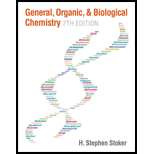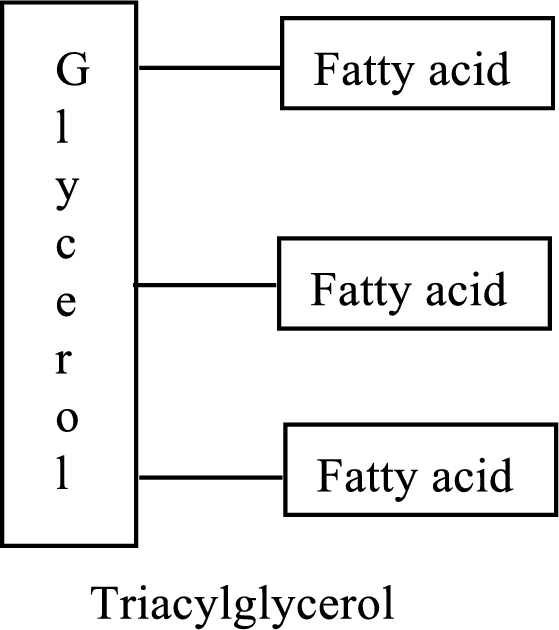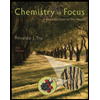
GENERAL,ORGANIC,+BIO.CHEM.-MINDTAP
7th Edition
ISBN: 9781305866966
Author: STOKER
Publisher: CENGAGE L
expand_more
expand_more
format_list_bulleted
Concept explainers
Question
Chapter 25, Problem 25.14EP
Interpretation Introduction
Interpretation: To explain the major
Concept introduction: Triacylglycerols are lipid molecules that are formed by fatty acids. They constitute around 98% of the total dietary lipids. These lipid molecules undergo digestion/breakdown into simpler forms in the

Expert Solution & Answer
Want to see the full answer?
Check out a sample textbook solution
Students have asked these similar questions
For the titration of a divalent metal ion (M2+) with EDTA, the stoichiometry of the reaction is typically:
1:1 (one mole of EDTA per mole of metal ion)
2:1 (two moles of EDTA per mole of metal ion)
1:2 (one mole of EDTA per two moles of metal ion)
None of the above
Please help me solve this reaction.
Indicate the products obtained by mixing 2,2-dimethylpropanal with acetaldehyde and sodium ethoxide in ethanol.
Chapter 25 Solutions
GENERAL,ORGANIC,+BIO.CHEM.-MINDTAP
Ch. 25.1 - Which of the following statements about digestion...Ch. 25.1 - Prob. 2QQCh. 25.1 - The major function of bile released during...Ch. 25.1 - The two major products of triacylglycerol...Ch. 25.1 - Prob. 5QQCh. 25.2 - Hormone-sensitive lipase needed for...Ch. 25.2 - Prob. 2QQCh. 25.2 - Which of the following is not a product of...Ch. 25.3 - Prob. 1QQCh. 25.3 - What is the intermediate compound in the two-step...
Ch. 25.3 - Prob. 3QQCh. 25.4 - Prob. 1QQCh. 25.4 - Prob. 2QQCh. 25.4 - Prob. 3QQCh. 25.4 - Prob. 4QQCh. 25.4 - Prob. 5QQCh. 25.4 - Prob. 6QQCh. 25.5 - Prob. 1QQCh. 25.5 - Prob. 2QQCh. 25.5 - Prob. 3QQCh. 25.6 - Prob. 1QQCh. 25.6 - Prob. 2QQCh. 25.6 - Prob. 3QQCh. 25.6 - Prob. 4QQCh. 25.6 - Prob. 5QQCh. 25.6 - Prob. 6QQCh. 25.7 - Prob. 1QQCh. 25.7 - Prob. 2QQCh. 25.7 - Prob. 3QQCh. 25.7 - Prob. 4QQCh. 25.7 - The reducing agent needed in the process of...Ch. 25.7 - Prob. 6QQCh. 25.8 - Prob. 1QQCh. 25.8 - Prob. 2QQCh. 25.9 - Prob. 1QQCh. 25.9 - Prob. 2QQCh. 25.9 - Prob. 3QQCh. 25.9 - Prob. 4QQCh. 25.10 - Which of the following substances cannot be...Ch. 25.10 - Prob. 2QQCh. 25.10 - Which of the following processes occurs within the...Ch. 25.11 - Prob. 1QQCh. 25.11 - Prob. 2QQCh. 25.11 - Prob. 3QQCh. 25 - Indicate whether each of the following aspects of...Ch. 25 - Indicate whether each of the following aspects of...Ch. 25 - Indicate whether each of the following pairings of...Ch. 25 - Prob. 25.4EPCh. 25 - Indicate whether each of the following statements...Ch. 25 - Prob. 25.6EPCh. 25 - Prob. 25.7EPCh. 25 - What is a chylomicron?Ch. 25 - What are the products of the complete hydrolysis...Ch. 25 - What are the major products of the incomplete...Ch. 25 - Prob. 25.11EPCh. 25 - At what location are free fatty acids and...Ch. 25 - Prob. 25.13EPCh. 25 - Prob. 25.14EPCh. 25 - Prob. 25.15EPCh. 25 - Prob. 25.16EPCh. 25 - Prob. 25.17EPCh. 25 - Prob. 25.18EPCh. 25 - Prob. 25.19EPCh. 25 - Prob. 25.20EPCh. 25 - Prob. 25.21EPCh. 25 - Prob. 25.22EPCh. 25 - Prob. 25.23EPCh. 25 - Prob. 25.24EPCh. 25 - Prob. 25.25EPCh. 25 - Prob. 25.26EPCh. 25 - Prob. 25.27EPCh. 25 - Identify the oxidizing agent needed in Step 3 of a...Ch. 25 - Prob. 25.29EPCh. 25 - Prob. 25.30EPCh. 25 - Prob. 25.31EPCh. 25 - Prob. 25.32EPCh. 25 - Prob. 25.33EPCh. 25 - Prob. 25.34EPCh. 25 - Prob. 25.35EPCh. 25 - Prob. 25.36EPCh. 25 - Prob. 25.37EPCh. 25 - Prob. 25.38EPCh. 25 - Prob. 25.39EPCh. 25 - Prob. 25.40EPCh. 25 - Prob. 25.41EPCh. 25 - Prob. 25.42EPCh. 25 - How many turns of the -oxidation pathway would be...Ch. 25 - How many turns of the -oxidation pathway would be...Ch. 25 - Prob. 25.45EPCh. 25 - Prob. 25.46EPCh. 25 - Prob. 25.47EPCh. 25 - Prob. 25.48EPCh. 25 - Prob. 25.49EPCh. 25 - Explain why fatty acids cannot serve as fuel for...Ch. 25 - Prob. 25.51EPCh. 25 - Prob. 25.52EPCh. 25 - Prob. 25.53EPCh. 25 - Prob. 25.54EPCh. 25 - Prob. 25.55EPCh. 25 - Prob. 25.56EPCh. 25 - Prob. 25.57EPCh. 25 - Prob. 25.58EPCh. 25 - Prob. 25.59EPCh. 25 - Prob. 25.60EPCh. 25 - Prob. 25.61EPCh. 25 - Why does a deficiency of carbohydrates in the diet...Ch. 25 - Prob. 25.63EPCh. 25 - Prob. 25.64EPCh. 25 - Prob. 25.65EPCh. 25 - Prob. 25.66EPCh. 25 - Prob. 25.67EPCh. 25 - Prob. 25.68EPCh. 25 - Prob. 25.69EPCh. 25 - Prob. 25.70EPCh. 25 - Prob. 25.71EPCh. 25 - Prob. 25.72EPCh. 25 - Prob. 25.73EPCh. 25 - Prob. 25.74EPCh. 25 - Prob. 25.75EPCh. 25 - Severe ketosis situations produce acidosis....Ch. 25 - Prob. 25.77EPCh. 25 - Prob. 25.78EPCh. 25 - Prob. 25.79EPCh. 25 - Prob. 25.80EPCh. 25 - Prob. 25.81EPCh. 25 - Prob. 25.82EPCh. 25 - Prob. 25.83EPCh. 25 - Prob. 25.84EPCh. 25 - Prob. 25.85EPCh. 25 - Prob. 25.86EPCh. 25 - Prob. 25.87EPCh. 25 - Prob. 25.88EPCh. 25 - Prob. 25.89EPCh. 25 - Prob. 25.90EPCh. 25 - Prob. 25.91EPCh. 25 - Prob. 25.92EPCh. 25 - Prob. 25.93EPCh. 25 - Prob. 25.94EPCh. 25 - What role does molecular oxygen, O2, play in fatty...Ch. 25 - Prob. 25.96EPCh. 25 - Prob. 25.97EPCh. 25 - Prob. 25.98EPCh. 25 - Prob. 25.99EPCh. 25 - Prob. 25.100EPCh. 25 - Prob. 25.101EPCh. 25 - Prob. 25.102EPCh. 25 - Prob. 25.103EPCh. 25 - Prob. 25.104EPCh. 25 - Prob. 25.105EPCh. 25 - Prob. 25.106EPCh. 25 - Prob. 25.107EPCh. 25 - Prob. 25.108EPCh. 25 - Prob. 25.109EPCh. 25 - Prob. 25.110EPCh. 25 - Prob. 25.111EPCh. 25 - Prob. 25.112EPCh. 25 - Prob. 25.113EPCh. 25 - Prob. 25.114EP
Knowledge Booster
Learn more about
Need a deep-dive on the concept behind this application? Look no further. Learn more about this topic, chemistry and related others by exploring similar questions and additional content below.Similar questions
- Synthesize 2-Ethyl-3-methyloxirane from dimethyl(propyl)sulfonium iodide using the necessary organic or inorganic reagents. Draw the structures of the compounds.arrow_forwardSynthesize 2-Hydroxy-2-phenylacetonitrile from phenylmethanol using the necessary organic or inorganic reagents. Draw the structures of the compounds.arrow_forwardSynthesize N-Methylcyclohexylamine from cyclohexanol using the necessary organic or inorganic reagents. Draw the structures of the compounds.arrow_forward
- Synthesize N-Methylcyclohexylamine from cyclohexanol using the necessary organic or inorganic reagents. Draw the structures of the compounds.arrow_forwardIf possible, please provide the formula of the compound 3,3-dimethylbut-2-enal.arrow_forwardSynthesize 1,4-dibromobenzene from acetanilide (N-phenylacetamide) using the necessary organic or inorganic reagents. Draw the structures of the compounds.arrow_forward
- Indicate the products obtained by mixing (3-oxo-3-phenylpropyl)triphenylphosphonium bromide with sodium hydride.arrow_forwardWe mix N-ethyl-2-hexanamine with excess methyl iodide and followed by heating with aqueous Ag2O. Indicate the major products obtained.arrow_forwardIndicate the products obtained by mixing acetophenone with iodine and NaOH.arrow_forward
- Indicate the products obtained by mixing 2-Propanone and ethyllithium and performing a subsequent acid hydrolysis.arrow_forwardIndicate the products obtained if (E)-2-butenal and 3-oxo-butanenitrile are mixed with sodium ethoxide in ethanol.arrow_forwardQuestion 3 (4 points), Draw a full arrow-pushing mechanism for the following reaction Please draw all structures clearly. Note that this intramolecular cyclization is analogous to the mechanism for halohydrin formation. COH Br + HBr Brarrow_forward
arrow_back_ios
SEE MORE QUESTIONS
arrow_forward_ios
Recommended textbooks for you
 General, Organic, and Biological ChemistryChemistryISBN:9781285853918Author:H. Stephen StokerPublisher:Cengage Learning
General, Organic, and Biological ChemistryChemistryISBN:9781285853918Author:H. Stephen StokerPublisher:Cengage Learning Organic And Biological ChemistryChemistryISBN:9781305081079Author:STOKER, H. Stephen (howard Stephen)Publisher:Cengage Learning,
Organic And Biological ChemistryChemistryISBN:9781305081079Author:STOKER, H. Stephen (howard Stephen)Publisher:Cengage Learning, Chemistry for Today: General, Organic, and Bioche...ChemistryISBN:9781305960060Author:Spencer L. Seager, Michael R. Slabaugh, Maren S. HansenPublisher:Cengage Learning
Chemistry for Today: General, Organic, and Bioche...ChemistryISBN:9781305960060Author:Spencer L. Seager, Michael R. Slabaugh, Maren S. HansenPublisher:Cengage Learning Introduction to General, Organic and BiochemistryChemistryISBN:9781285869759Author:Frederick A. Bettelheim, William H. Brown, Mary K. Campbell, Shawn O. Farrell, Omar TorresPublisher:Cengage Learning
Introduction to General, Organic and BiochemistryChemistryISBN:9781285869759Author:Frederick A. Bettelheim, William H. Brown, Mary K. Campbell, Shawn O. Farrell, Omar TorresPublisher:Cengage Learning Chemistry In FocusChemistryISBN:9781305084476Author:Tro, Nivaldo J., Neu, Don.Publisher:Cengage Learning
Chemistry In FocusChemistryISBN:9781305084476Author:Tro, Nivaldo J., Neu, Don.Publisher:Cengage Learning

General, Organic, and Biological Chemistry
Chemistry
ISBN:9781285853918
Author:H. Stephen Stoker
Publisher:Cengage Learning

Organic And Biological Chemistry
Chemistry
ISBN:9781305081079
Author:STOKER, H. Stephen (howard Stephen)
Publisher:Cengage Learning,

Chemistry for Today: General, Organic, and Bioche...
Chemistry
ISBN:9781305960060
Author:Spencer L. Seager, Michael R. Slabaugh, Maren S. Hansen
Publisher:Cengage Learning

Introduction to General, Organic and Biochemistry
Chemistry
ISBN:9781285869759
Author:Frederick A. Bettelheim, William H. Brown, Mary K. Campbell, Shawn O. Farrell, Omar Torres
Publisher:Cengage Learning

Chemistry In Focus
Chemistry
ISBN:9781305084476
Author:Tro, Nivaldo J., Neu, Don.
Publisher:Cengage Learning
DIGESTER-35 | VITAMINS AND THEIR RELATED COENZYMES| GPAT | NIPER | PHARMACIST| DI; Author: GPAT DISCUSSION CENTER;https://www.youtube.com/watch?v=CGrdNYmho0s;License: Standard YouTube License, CC-BY